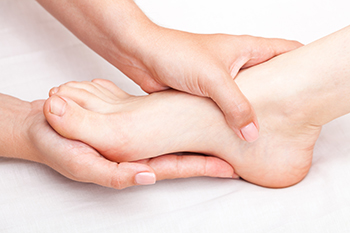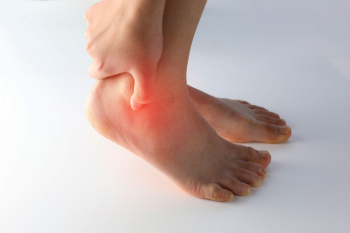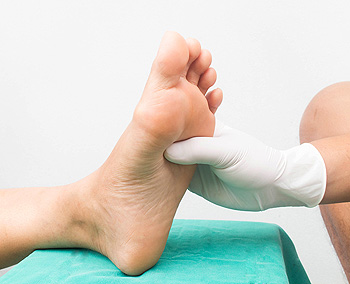
The feet can offer important clues about thyroid health, often showing symptoms that are easy to overlook. Cracked heels may be one of the earliest signs, especially when dryness persists despite moisturizing. Itchy feet can also occur due to slowed skin cell turnover, commonly seen with low thyroid function. Cold feet are another frequent symptom, as the thyroid helps regulate body temperature and poor circulation may result from an underactive thyroid. Additionally, swollen feet can develop due to fluid retention, which sometimes accompanies hormonal imbalances linked to thyroid conditions. These foot-related signs should not be ignored, especially when they appear together or persist. If you have any of the above foot symptoms, it is suggested that you consult a podiatrist who can treat various foot conditions, and discuss the connection regarding possible thyroid disease.
When dealing with systemic disease of the feet, it is extremely important to check the affected areas routinely so that any additional problems are caught quickly. If you have any concerns about your feet and ankles contact Robert Dunne, DPM from Lake Washington Foot and Ankle Center. Our doctor will assist you with all of your podiatric needs.
Systemic Diseases of the Feet
Systemic diseases affect the whole body, and symptoms usually are displayed in the feet. This condition can make a patient’s ability to walk unbearable. Systemic diseases include gout, diabetes mellitus, neurological disorders, and arthritis.
Gout – is caused by an excess of uric acid in the body. Common symptoms include pain, inflammation, and redness at the metatarsal/phalangeal joint of the base big toe. Gout can be treated by NSAIDs to relieve pain and inflammation, and other drugs that lower the acid levels in the body.
Diabetes mellitus – is an increase in the level of blood sugar that the body cannot counteract with its own insulin. Failure to produce enough insulin is a factor in Diabetes.
Diabetes of the Feet
Diabetic Neuropathy – may lead to damaged nerves and affect the feet through numbness and loss of sensation.
Peripheral Vascular Disease – can restrict the blood flow to the feet, and often times lead to amputation of the feet.
If you have any questions please feel free to contact our offices located in Melbourne and Palm Bay, FL . We offer the newest diagnostic and treatment technologies for all your foot and ankle needs.

Gout is a painful type of arthritis that can affect the ankle, not just the big toe. It develops when uric acid builds up in the body and forms sharp crystals in the joints. When this occurs in the ankle, it may cause sudden, sharp pain along with swelling, redness, and warmth in the area. Movements like walking or climbing stairs can become difficult during a flare-up. Gout flare-ups in the ankle may last for several days and often return over time, if not properly managed. Risk factors include a diet high in red or organ meats, alcohol consumption, sugary beverages, excess body weight, and high blood pressure. A podiatrist can help determine whether gout is the cause of your ankle pain by examining the foot and ordering diagnostic tests, including bloodwork or imaging. Once diagnosed, a podiatrist can recommend treatment that may include medication to lower uric acid levels and reduce inflammation. If you are experiencing sharp pain in your ankles, it is suggested that you schedule an appointment with a podiatrist for an exam to determine if gout is the cause.
Gout is a foot condition that requires certain treatment and care. If you are seeking treatment, contact Robert Dunne, DPM from Lake Washington Foot and Ankle Center. Our doctor will treat your foot and ankle needs.
What Is Gout?
Gout is a type of arthritis caused by a buildup of uric acid in the bloodstream. It often develops in the foot, especially the big toe area, although it can manifest in other parts of the body as well. Gout can make walking and standing very painful and is especially common in diabetics and the obese.
People typically get gout because of a poor diet. Genetic predisposition is also a factor. The children of parents who have had gout frequently have a chance of developing it themselves.
Gout can easily be identified by redness and inflammation of the big toe and the surrounding areas of the foot. Other symptoms include extreme fatigue, joint pain, and running high fevers. Sometimes corticosteroid drugs can be prescribed to treat gout, but the best way to combat this disease is to get more exercise and eat a better diet.
If you have any questions please feel free to contact our offices located in Melbourne and Palm Bay, FL . We offer the newest diagnostic and treatment technologies for all your foot and ankle needs.

Custom orthotics can be used to relieve foot pain and discomfort. They're also used to treat various foot conditions and deformities. Flat feet, bunions, and Morton's neuroma are just a few of the foot conditions that have been known to benefit from the use of orthotics.
Comfy feet are happy feet! Contact us today.

Peripheral neuropathy is a condition involving damage to the peripheral nerves, often affecting the feet, toes, and ankles. Patients may experience numbness, tingling, burning sensations, or sharp, stabbing pain that tends to worsen at night. As the sensory nerves in the feet become damaged, there is a reduced ability to feel temperature changes or pain, which can increase the risk of unnoticed injuries, infections, and foot ulcers. Over time, this nerve damage can also weaken the muscles in the feet and ankles, resulting in instability and difficulty walking. Diabetes is a common cause of peripheral neuropathy, and long-term high blood sugar levels can further harm nerves and the small blood vessels that supply them. Other contributing factors include alcohol misuse, nutritional deficiencies, and certain medical conditions. A podiatrist can help manage symptoms, reduce the risk of complications, and monitor nerve health through regular foot exams. In more advanced cases, surgery may be necessary to relieve pressure on specific nerves. If you have symptoms of peripheral neuropathy affecting your feet, it is suggested that you schedule an appointment with a podiatrist for an exam and ongoing treatment.
Neuropathy
Neuropathy can be a potentially serious condition, especially if it is left undiagnosed. If you have any concerns that you may be experiencing nerve loss in your feet, consult with Robert Dunne, DPM from Lake Washington Foot and Ankle Center. Our doctor will assess your condition and provide you with quality foot and ankle treatment for neuropathy.
What Is Neuropathy?
Neuropathy is a condition that leads to damage to the nerves in the body. Peripheral neuropathy, or neuropathy that affects your peripheral nervous system, usually occurs in the feet. Neuropathy can be triggered by a number of different causes. Such causes include diabetes, infections, cancers, disorders, and toxic substances.
Symptoms of Neuropathy Include:
- Numbness
- Sensation loss
- Prickling and tingling sensations
- Throbbing, freezing, burning pains
- Muscle weakness
Those with diabetes are at serious risk due to being unable to feel an ulcer on their feet. Diabetics usually also suffer from poor blood circulation. This can lead to the wound not healing, infections occurring, and the limb may have to be amputated.
Treatment
To treat neuropathy in the foot, podiatrists will first diagnose the cause of the neuropathy. Figuring out the underlying cause of the neuropathy will allow the podiatrist to prescribe the best treatment, whether it be caused by diabetes, toxic substance exposure, infection, etc. If the nerve has not died, then it’s possible that sensation may be able to return to the foot.
Pain medication may be issued for pain. Electrical nerve stimulation can be used to stimulate nerves. If the neuropathy is caused from pressure on the nerves, then surgery may be necessary.
If you have any questions, please feel free to contact our offices located in Melbourne and Palm Bay, FL . We offer the newest diagnostic and treatment technologies for all your foot care needs.
